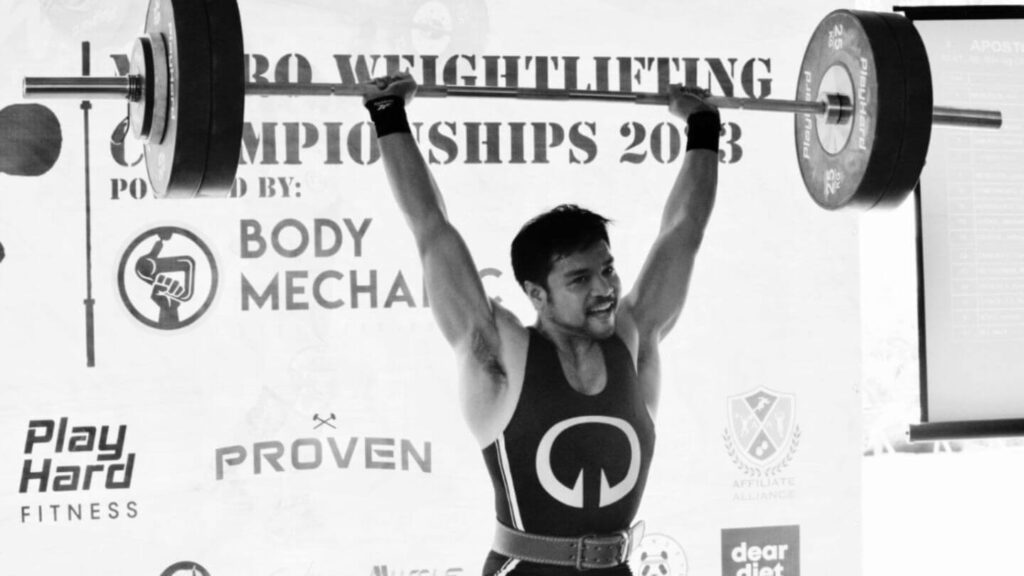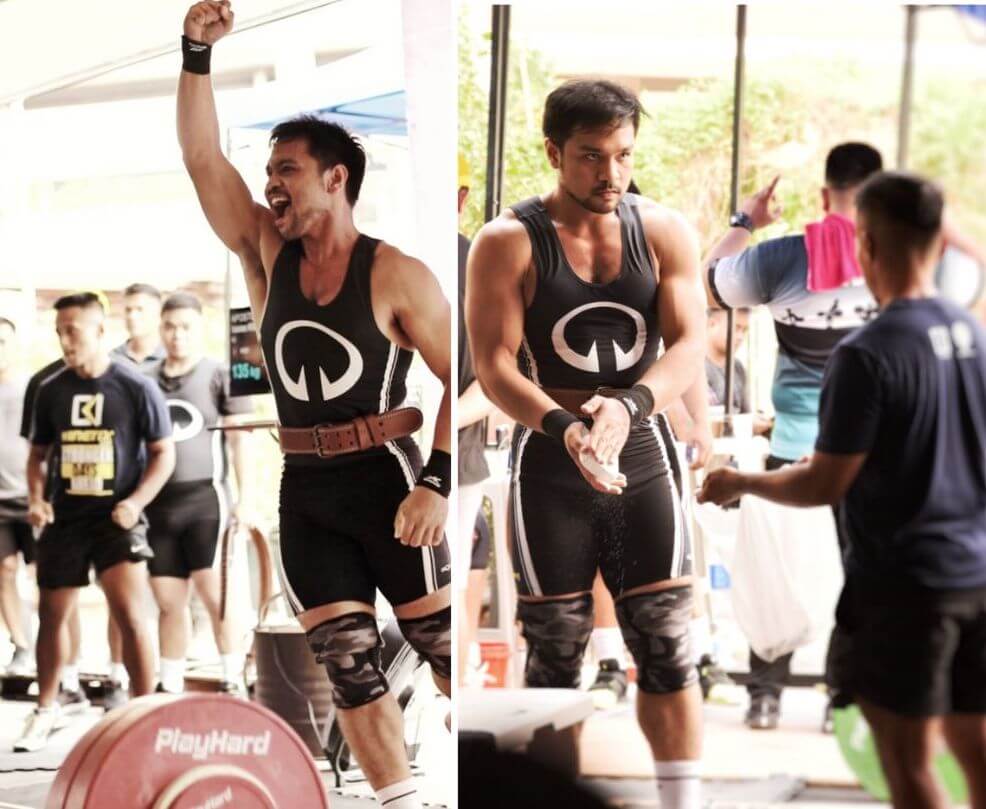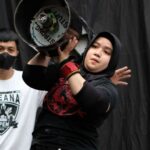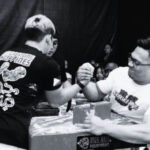
We’re here with Coach Khaim of Kinetix Lab. They just finished with their quarterly fitness test. They’ve done their squats, benches, deadlifts, max rep pull ups and a one kilometer run for time for good measure. To top it all off they have a sit and reach test for flexibility and body fat analysis rounding out all general aspects of fitness.
Carlos: I haven’t seen any other gyms that do that for their whole roster, so that’s pretty interesting. Does it keep you on your toes, as coaches as well, that you have to be also physically fit?
Khaim: Well, yeah. I’m a firm believer in practicing what you preach, so if you want to be a practitioner, if you want to be a teacher of health, you have to be a practitioner of health.
Carlos: Yeah, it got a bit crazy earlier. Hardcore, dude. The atmosphere was intense. So primarily weight lifting is your main sport, how did you get into it?
Khaim: I got into the basics of weightlifting when I was taught by Coach Mow from the now defunct Techno Hub gym of Kinetix Lab.
But it was just the basics and it was just for fun. After about two months of powerlifting, I stumbled upon a YouTube video. It was the IWF 2018 World’s Ashgabat, Turkmenistans 81kg class where I first witnessed Lu Xiaojun. I just saw him casually clean and jerking my max deadlift. And I said, that’s what I want to do. From then on it just became an obsession. So that was in mid 2019 and It’s been four years since I started weightlifting.

Carlos: Within those four years of developing your own routines, How did your training routine change over the course of four years? And how often did it change, and how often do you train?
Khaim: Back then I just trained four to five times a week because I just like working out in general. But then, It changed in the sense that I had to become smarter with how I was moving because I wasn’t. The progress was fast, but once I hit some okay numbers, that was when everything started getting very, very slow.
I then realized now that it was a technique issue. So from that point on, I focused so much of my attention to just getting better at moving rather than pushing numbers, and I guess it helped me a lot.
I’ve undergone two coaches; I availed Sika Strength’s personal training for a few months, and then I switched over to Weightlifting AI just to try it because my technique was sound. But then, I had a wrist injury back in February. I opted to get training from Josh Gibson of Philosophical Weightlifting.
He’s been my coach for the past for four months and he got me from a broken left wrist and a 70 snatch, and a 90 kilo clean and jerk up to a 105 snatch and a 135 clean and jerk in competition.
Carlos: I personally saw you with the cast and rehabbing it and going into work everyday and doing stuff for it. How was the rehabilitation journey? Didnt you do more in competition post injury?
Khaim: Yes, I did more in the snatch in the total. And matched my competition PR for the first attempt.
Carlos: How was the injury journey for you?
Khaim: When I got injured, it gave me a lot of time to just focus on getting very strong legs, ridiculously strong legs. I went from a 190 squat to a 210 squat and a 227.5 conventional deadlift done in squat shoes.
Rehab wise was, it felt long, but now that I think about it, it was just four months. Fracture of the ulnar styloid process of my left wrist. The bone healed fast. It was the ligaments around it that took a while.
Carlos: It speaks volumes on perseverance of just doing what you can in training mad props. So, you talked about AI programming?
Khaim: Yes, it was an experiment that Weightlifting House did in collaboration with Max Aita.
So it’s not really AI in the sense that it just guesses what you want to do. Think of it like an equation wherein you put your numbers and based on your proportions, your weight, and how often you train, it feeds into whatever program that Max Aita did because it’s, it’s basically Max’s brain.
Carlos: So what are your thoughts on AI and how it will affect programming in the future? Do you have bank on it? Like, do you trust it?
Khaim: AI for programming wise,from my experience and from my thing, I can speak for a lot of coaches here, your progress is definitely almost never linear unless you’re a beginner.
There are going to be some days wherein you can’t hit the numbers that you’re supposed to. So how do you go about it from that point? So that means you just have to lower it down to something you can better manage. And that’s something that only a coach can do.
Carlos: The organic touch.
Khaim: Yes, organic. The free flowing nature.
Carlos: Speaking of coaches, some people can’t wrap their head around someone being a coach and also needing a coach. A lot of people new to the game, they don’t understand why. Can you touch upon that subject on why it’s important even as a coach to have your own coaching and being able to separate the athlete and the coach as being two different pursuits?
Khaim: My philosophy as a person is just always keep learning. There’s always going to be someone smarter than you.I invested in my coach because I trust the process.. And, honestly It just takes away a lot of the stress of being an athlete.
Because competing is way different than coaching. If you’re coaching someone, it’s going to be multiple people and you’re going to be writing out their programs, you’re going to be training them.Training yourself and writing your own program, that’s hard.
There’s going to be some days where you say, you know what, I wrote this program, I can just max out today. You need someone else to do that for you, with how I handle my coaching, my clients when I have them actually, reel some of the intensity back in. That’s what my coach does for me. So a coach is a coach but as an athlete, you have to be an athlete. You have to be coachable.
Carlos: So, aside from weightlifting, do you plan on competing in other sports?
Khaim: Interestingly enough, my first ever lifting competition was a powerlifting meet.
At the 2022 Metro Manila Open. That was my first ever competition, and then right afterwards, I competed in another powerlifting competition before I did my first ever weightlifting meet. Where I won, it was a bit symbolic because it was my first WL competition and it was the first time I ever won gold in anything.
In the future, once I hit my goals for weightlifting, obviously it’s not a sport built for young people. I’m reaching that age where everything’s starting to slow down. I’m going to eventually transition more to maybe powerlifting and strongman because I have very good overhead strength and stability.
Carlos: You are most welcome to do strongman good sir!. Speaking of weightlifting goals, what are your weightlifting goals? Like long term, short term? Goals that you want to reach for before you call it quits?
Khaim: Short term goal, if I, if you can count one year as a short term. want to compete and place in, the Philippine National Games next year. If I can win, that would be amazing. And then I’d be, hopefully get picked for the national team and compete abroad. Just once in my life, I would want to compete abroad. If I have better chances as a Masters athlete, I’m gonna do that. I’m gonna compete as a Masters athlete.
Carlos: So how old are you?
Khaim: I’m turning 26 this year. Okay, so you have nine years to go. Nine years to go.
Keep healthy. Hopefully my technique has gotten better where I don’t have to rely on strength anymore. That’s actually the point. You can’t keep relying on your strength. Obviously if you’re strong you can do more, but if you’re also technically sound, you can perform better.
Long term goal would be to hit a 300kg total, hopefully by the time I reach a 300 total, i’ll be the fourth or fifth ever Filipino to do it. Join the 300kg Club.
Carlos: What advice would you give people who are just looking out to start in the sport, given, given your years of tenure in it?
Khaim: Well number one is, and I really cannot stress this enough.Get a coach. I spent two and a half years without a coach. I got very good technique, but the programming was garbage. So I wasn’t able to hit bigger numbers than I should have been able to hit. Obviously you have to focus a lot on your technique, which is why the coach is there. He takes every little thing into consideration about your technique because a lot of what weightlifting is, is if it looks good, it’s very good technique.
If it looks bad, then it’s very bad technique. I think that’s one of the things that attracted me to weightlifting is that it looks really cool. So please, find a coach, someone you can actually either. talk to or have a video chat with, well the best is if you go to their gym and have them train you, but if not then at least have them check your form every now and again.
Weightlifting is more technique rather than anything.
Carlos: Not a lot of people understand the differences between the three dominant strength sports here in the Philippines. What would you say, as an insider looking into it, comparing powerlifting, weightlifting, and strongman, what would you say is the biggest difference between the three of them?
Khaim: Powerlifting, it’s with the three big lifts, the squat bench deadlift, it’s a lot of maximum force output, so it’s, just get the weight up no matter what.
With strongman, as someone that has tried it once and I literally mean once. You have to be really big and strong in Strongman, especially the higher weight classes, but you’re definitely more athletic at Strongman than powerlifting. Not to say that powerlifters are unathletic, but in terms of hierarchy, I would say that strong men, are way more athletic than power lifters because of the amount of moving that they have to do and all.
Then you get to the weight lifters who are just very, who are very fast and very strong. Very technically and very athletic. WL speaks most to me as a former athlete from all the way from elementary up to high school. Speed, explosion, mobility, everything. It’s crazy. It’s basically art and movement.
Carlos: To close out the interview, to close out the interview, uh, do you have any parting words for anyone that might be reading or, like, listening to this Coach?
Khaim: No matter what endeavor you choose, whether it’s an endurance sport, ball sport, team sport, or, a barbell sport or strength sport, take time to just learn, take time to just get very good at the basics and refining your technique because that goes a long way rather than just getting big and strong.


